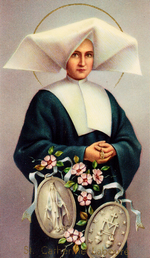Lives of the Saints
Our Models and Protectors
Spiritual Bouquet:
November 28

Saint Catherine Labouré
Virgin, Visionary
(1806-1876)
Saint Catherine Zoé Labouré was born in a small village of France in 1806, the daughter of a well-to-do farmer who had at one time wanted to become a priest, and his very Christian wife. Catherine, the ninth of the eleven living children, lost her mother when she was only nine years old and had to abandon school to go to live with an aunt, accompanied by her younger sister. Two years later she was recalled to take charge of the household, because the older children had all left, one to become a Sister of Saint Vincent de Paul, the others to marry or seek a living elsewhere.
She made a vow of virginity when still very young, desiring to imitate the Holy Virgin, to whom she had confided herself when her mother died. She longed to see Her, and she prayed, in her simplicity, for that grace. She spent as many hours as possible in the Chapel of the Virgin in the village church, without, however, neglecting the work of the household. She talked to Our Lady as to a veritable mother, and indeed the Mother of Christ and ours would prove Herself to be such. Catherine wished to become a nun, without having opted for any particular community; but one day she saw a venerable priest in a dream, saying Mass in her little village church. He turned to her afterwards and made a sign for her to come forward, but in her dream she retreated, walking backwards, unable to take her gaze from his face. He said to her: Now you flee me, but later you will be happy to come to me; God has plans for you. The dream was realized and, as a postulant in the Community of Saint Vincent de Paul, she assisted at the translation of his relics to a nearby church of Paris. She had indeed recognized his picture one day in one of the convents of the Sisters of Charity, and obtained her father's consent to enter that Congregation when her younger sister was old enough to replace her at home.
Catherine's interior life was alimented by the visions she frequently had of Jesus in the Blessed Sacrament, where once she saw Him as Christ the King. And the designs of God for this humble novice began to be fulfilled, after Our Lady appeared to her in July of 1830, and confided to her the mission of having a Medal struck according to the living picture she saw one night, when a little Angel led her to the convent Chapel, and there she knelt at the Virgin's feet to hear the words which would be the motivating force of her forty-six years of religious life.
Once more — insofar as we know — she would see the Blessed Mother, on November 27th of the same year, when one afternoon while at prayer with her Sisters, she beheld Her to one side of the chapel, Her feet poised on a globe, on which was prostrate a greenish serpent; the hands of the Virgin were holding a golden globe at the level of the heart, as though offering it to God, said Catherine later, in an attitude of supplication, Her eyes sometimes raised to heaven, sometimes looking down at the earth, and Her lips murmuring a prayer for the entire world. The face of the Virgin was of incomparable, indescribable beauty, with a pleading expression which plunged the Sister into ravishment, while she listened to Her prayers. The Immaculate Virgin, after having offered to God Her Compassion with the suffering Christ, prayed for all men and for each one in particular; she prayed for this poor world, that God might take pity on its ignorance, its weakness and faults, and that by pardoning He would hold back the arm of Divine Justice, raised to strike. She prayed the Lord to give peace to the universe.
For many years Catherine kept her secrets from all save her confessor, Father Aladel, priest of the Mission of Saint Vincent, who, wanting to be able to continue with his penitent, saw to it that she was not sent far from Paris, after he had fulfilled the first mission of having the Medal struck. He died, however, before having the statue made according to this second vision, as Our Lady desired. Catherine suffered much from her inability to accomplish the second part of her mission. When she finally confided this second desire of Our Lady to her Sister Superior, a statue of Our Lady, Queen of the World and Mediatrix of all Graces, was made for two Chapels of the nuns.
Saint Catherine died in 1876, after spending her life in the domestic and agricultural duties associated with the kitchen and garden, and in general caring for the elderly of the Hospice of Enghien at Reuilly, only about three miles southeast of Paris. Among her writings recounting the apparitions, we read: Oh, how beautiful it will be to hear it said: Mary is Queen of the universe. That will be a time of peace, joy and happiness which will be long... She will be borne like a banner and will make a tour of the world. The Virgin foretold that this time would come only after the entire world will be in sadness... Afterwards, peace.
La Sainte du silence et la Vierge au globe, by G. Gaetano di Sales (Centre Marial Canadien: Nicolet, 1951); Vie de Catherine Labouré, by Rev. R. Laurentin (Desclée de Brouwer: Paris, 1980)